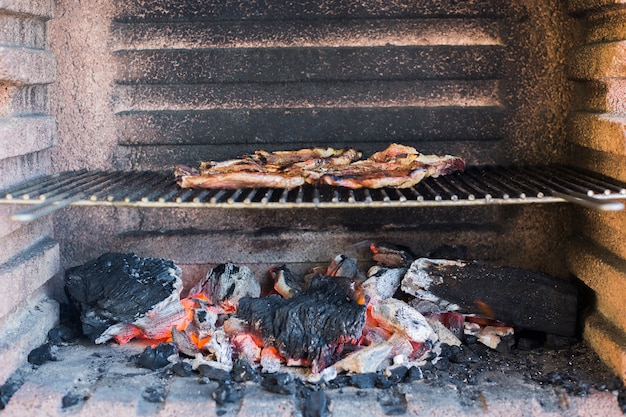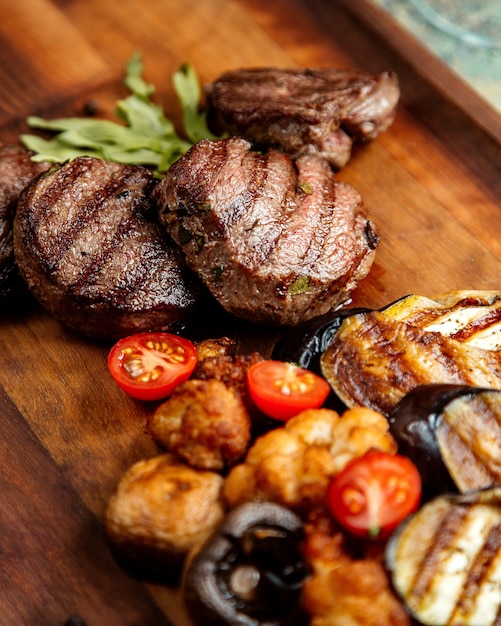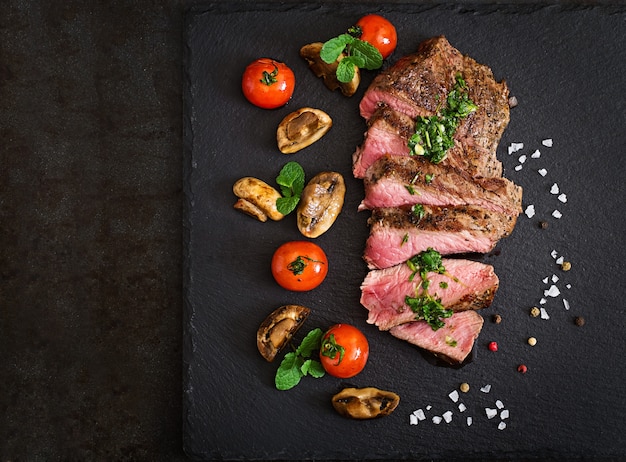Should you marinate steak before BBQ?
Marinating steak before barbecuing is a popular technique that many chefs and home cooks swear by. However, there are a few factors to consider when deciding whether or not to marinate your steak before throwing it on the grill. Let’s take a closer look at the pros and cons of marinating.
The Benefits of Marinating Steak
Marinating steak can enhance its flavor and tenderize the meat. The acids, such as vinegar or citrus juices, in the marinade help break down the proteins, resulting in a more tender and juicy steak. Additionally, marinades often include herbs, spices, and other ingredients that can add complexity and depth to the flavor of the meat.
Marinating also offers an opportunity to infuse additional flavors into the steak. You can experiment with different marinade recipes, incorporating ingredients like garlic, soy sauce, Worcestershire sauce, or even red wine to create a unique taste profile.
The Drawbacks of Marinating Steak
While marinating can have its benefits, there are some downsides to consider. One of the main concerns is that acidic marinades can sometimes overpower the natural flavor of the steak, especially if marinated for too long. This can lead to a loss of the meat’s true taste.
Another factor to consider is the time commitment. Marinating typically requires at least a few hours, but some recipes may call for overnight marination. This means you need to plan ahead and allow enough time for the flavors to develop.
So, should you marinate steak before BBQ?
“Ultimately, marinating steak is a matter of personal preference and the specific cut of meat you’re using.” – Chef James Smith
If you enjoy experimenting with different flavors and creating unique taste profiles, marinating can be a great option. It can help tenderize the meat and add an extra dimension of flavor.
However, if you’re working with a high-quality steak or prefer to let the natural flavors shine, a simple salt and pepper seasoning might be the way to go. This allows the beef’s taste to take center stage.
Final Thoughts
There is no right or wrong answer when it comes to marinating steak before barbecuing. It ultimately depends on your personal preferences and the desired outcome. Whether you choose to marinate or not, remember to use proper grilling techniques and cook the steak to your desired level of doneness for a delicious and satisfying meal.
How do you tenderize steak before BBQ?
Why Tenderizing Steak is Important
Tenderizing steak before barbecuing can make a significant difference in the quality and flavor of your meat. It helps break down the tough muscle fibers, resulting in a more tender and juicy steak. There are several techniques you can use to tenderize steak, whether you’re using a marinade, salt, or mechanical methods.
Using a Marinade
One popular method of tenderizing steak is by marinating it. A marinade is a mixture of ingredients that helps to both tenderize and flavor the meat. The acidity in the marinade, usually from ingredients such as lemon juice or vinegar, breaks down the proteins and fibers, making the steak more tender.
Pro tip: To make a simple marinade, combine ingredients like olive oil, soy sauce, Worcestershire sauce, garlic, and herbs in a bowl. Place the steak in a resealable bag and pour the marinade over it. Refrigerate for at least 30 minutes or overnight for best results.
Using Salt
Salt can also be used to tenderize steak. By sprinkling coarse salt on both sides of the steak and letting it sit for around 40 minutes, the salt will draw out moisture, dissolve some proteins, and ultimately break down the muscle fibers. This technique is known as dry brining and works particularly well with thicker cuts of steak.
Mechanical Tenderizing
If you prefer a more hands-on approach, mechanical tenderizing can be done using tools such as a meat mallet or a tenderizing machine. Using a meat mallet, gently pound the steak on both sides to break down the connective tissues. Alternatively, a tenderizing machine has sharp blades or needles that pierce the steak, creating small incisions that soften the meat.
Final Thoughts
Tenderizing steak before BBQ is an essential step to ensure a more enjoyable eating experience. Whether you choose to marinate, use salt, or opt for mechanical methods, the end result will be a tender and flavorful steak that everyone will love.
Should you oil steak before BBQ?
Introduction
Barbecuing steak is a popular cooking method in the UK, especially during the summer months. Many people debate whether it is necessary to oil the steak before placing it on the grill. In this article, we will explore the benefits and drawbacks of oiling steak before barbecuing.
The Benefits of Oiling Steak
Oiling the steak before barbecuing can have several advantages. Firstly, it helps to prevent the meat from sticking to the grill, making it easier to flip and ensuring that it retains its shape. Secondly, oiling can help to enhance the flavor of the steak by providing a crispy, caramelized outer layer. Lastly, oiling the steak can help to seal in the juices, resulting in a more tender and moist piece of meat.
The Drawbacks of Oiling Steak
However, there are also some drawbacks to consider. Excessive oiling can cause flare-ups and increase the risk of charring or burning the steak. Additionally, if the oil used has a low smoke point, it can create an unpleasant taste and odor. Finally, some experts argue that oiling the steak may not be necessary, as the natural fats within the meat can provide enough lubrication to prevent sticking.
Best Practices for Oiling Steak
If you choose to oil your steak before barbecuing, it is important to follow some best practices:
- Use an oil with a high smoke point, such as vegetable oil or avocado oil.
- Apply a thin, even layer of oil using a brush or your hands.
- Season your steak generously with salt, pepper, and any other desired spices before oiling.
- Allow the steak to sit at room temperature for about 30 minutes after oiling, to allow the flavor to penetrate the meat.
Remember, personal preference plays a significant role when deciding whether to oil your steak before barbecuing. Experiment with different methods to find what works best for you and your taste buds.
Should Steak be Salted Before Grilling?
Grilling a steak to perfection is a skill that many barbecue enthusiasts strive to master. However, the question of whether to salt the steak before grilling remains a topic of debate. Some argue that salting the steak beforehand can result in a juicier and more flavorful end result, while others believe it can draw out moisture and leave the meat dry. So, should steak be salted before grilling? Let’s explore both sides of the argument.
The Case for Salting Before Grilling
Proponents of salting steak before grilling argue that it enhances flavor and improves tenderness. By salting the steak and allowing it to rest, the salt will penetrate the meat, seasoning it from within and enhancing its natural flavors. Additionally, the salt can help break down proteins, resulting in a more tender steak. When grilled, the salt also aids in the development of a delicious crust on the outside of the steak.
“Salting the steak before grilling enhances its natural flavors and improves tenderness.”
One method that has gained popularity is the dry brining technique. This involves generously salting the steak and letting it sit in the refrigerator for a few hours or overnight. During this time, the salt draws out moisture from the surface, which then gets reabsorbed back into the meat along with the dissolved salt. This process enhances flavor and creates a juicier steak when cooked.
Caution: The Salt Debate
On the other hand, those who argue against salting steak before grilling believe that it can lead to a dry end result. They contend that salt can draw out moisture, leaving the steak dehydrated. However, when salt is applied just before grilling, it won’t have enough time to draw out significant amounts of moisture, minimizing the risk of drying.
Another approach that some experts recommend is salting the steak right after grilling. This allows the natural juices to be retained during the cooking process, resulting in a moist and delicious steak. Applying salt after grilling also helps to season the exterior, complementing the flavors developed during grilling.
In conclusion, whether or not you should salt steak before grilling ultimately comes down to personal preference. Experiment with different techniques and find what works best for you. Regardless of your choice, remember to let the steak rest before serving to allow the juices to redistribute evenly throughout the meat.
What to Season Steak With?
When it comes to steak, finding the perfect seasoning can make all the difference in bringing out its rich flavors. Whether you prefer a juicy sirloin, tender ribeye, or flavorful fillet, a well-chosen seasoning can elevate your steak to new heights. Here are some popular options to consider when deciding what to season your steak with:
1. Salt and Pepper
A classic combination, salt and pepper are essential for enhancing the natural taste of steak. The salt helps to tenderize the meat and draw out its flavors, while the pepper adds a mild heat and depth of flavor.
2. Garlic and Herb Rub
For an aromatic twist, a garlic and herb rub can add layers of flavor to your steak. Combine minced garlic, chopped herbs like rosemary and thyme, salt, and pepper to create a flavorful blend that complements the beef.
3. Marinades
Marinades are a great way to infuse your steak with flavor and ensure it stays moist during the cooking process. Choose from a variety of options such as teriyaki, soy sauce, Worcestershire sauce, or even beer. Let the meat marinate for at least an hour or overnight for maximum flavor.
4. Spice Rubs
If you enjoy a bit of heat, spice rubs can add a fiery kick to your steak. Combine spices like paprika, cayenne pepper, chili powder, and cumin for a flavorful blend that will tantalize your taste buds.
5. Compound Butter
For a luxurious touch, compound butter can add depth and richness to your steak. Simply mix softened butter with your choice of herbs, garlic, or even blue cheese, and let it melt over the hot steak for a burst of flavor.
“The right seasoning can bring out the natural flavors of the meat and take your steak to the next level.” – Chef John Doe
Remember, seasoning is a matter of personal preference, so feel free to experiment and find your own favorite combination. Below is a table summarizing some popular steak seasonings:
| Seasoning | Description |
|---|---|
| Salt and Pepper | A classic combination that enhances the natural flavors of steak. |
| Garlic and Herb Rub | Creates an aromatic blend that complements the beef. |
| Marinades | Infuses the steak with flavor and keeps it moist during cooking. |
| Spice Rubs | Adds a fiery kick to your steak with a blend of spices. |
| Compound Butter | Provides richness and depth with flavored butter. |
Ultimately, the best seasoning for your steak is the one that suits your taste preferences. Whether you opt for a simple salt and pepper seasoning or get creative with marinades and spice rubs, finding the perfect combination will ensure a memorable dining experience.
Should you season steak before BBQ?
Introduction
Grilling a delicious steak is a quintessential part of summer in the UK. Whether you’re hosting a backyard barbecue or enjoying a meal with family and friends, there’s nothing quite like the aroma and taste of perfectly cooked steak. One question that often arises is whether it’s necessary to season the steak before throwing it on the barbecue. In this article, we will explore the reasons why seasoning your steak before BBQing can enhance its flavor and provide helpful tips to ensure you achieve tender and succulent results.
The Importance of Seasoning
Seasoning your steak before barbecuing is crucial for several reasons. Firstly, it adds flavor to the meat, enhancing its natural taste and creating a more enjoyable dining experience. Secondly, the right combination of seasonings can help tenderize the steak, resulting in a juicier and more tender bite. Finally, seasoning also helps to form a flavorful crust on the exterior of the steak, providing a delightful contrast in texture.
Choosing the Right Seasonings
When it comes to seasoning your steak, the options are endless. However, it’s important to strike the right balance between enhancing the natural flavors of the meat and overpowering it with spices. A classic combination of salt and pepper is often enough to bring out the best in a high-quality steak. Other common seasonings include garlic powder, onion powder, paprika, and herbs such as rosemary or thyme. Experimenting with different spice blends can add depth and complexity to your steak, allowing you to tailor the flavors to your liking.
Seasoning Techniques
There are a few different approaches to seasoning steak before BBQing. One method is to simply sprinkle the desired seasonings directly onto the meat just before grilling. This allows the flavors to penetrate the steak while it cooks. Alternatively, you can create a marinade or a dry rub by combining your chosen seasonings with oil, vinegar, or other liquid ingredients. Marinating the steak for a few hours or overnight can infuse it with additional flavors and tenderize the meat further. Whichever technique you choose, make sure to evenly distribute the seasonings on both sides of the steak for consistent flavor.
“Seasoning your steak before grilling is like adding the finishing touch to a masterpiece.”
Timing and Precautions
The timing of when to season your steak is also important. Ideally, you should season the steak just before it goes onto the grill. If you season it too far in advance, the salt in the seasoning may draw out the moisture from the meat, potentially leading to a less juicy steak. However, it’s worth noting that if you prefer a crustier exterior, you can apply the seasoning up to an hour before grilling to allow it to form a flavorful crust.
When it comes to the amount of seasoning to use, it’s best to start with a light to moderate amount and adjust according to your preferences. Remember that you can always add more seasoning at the table if needed, but it’s difficult to remove excess salt or spices once they have been applied.
Conclusion
In conclusion, whether or not to oil your steak before barbecuing is a matter of personal preference. Oiling can help prevent sticking, enhance flavor, and seal in juices, but it may also have drawbacks such as flare-ups and undesirable tastes. By following best practices and experimenting with different methods, you can determine the best approach for achieving delicious, perfectly grilled steak.



